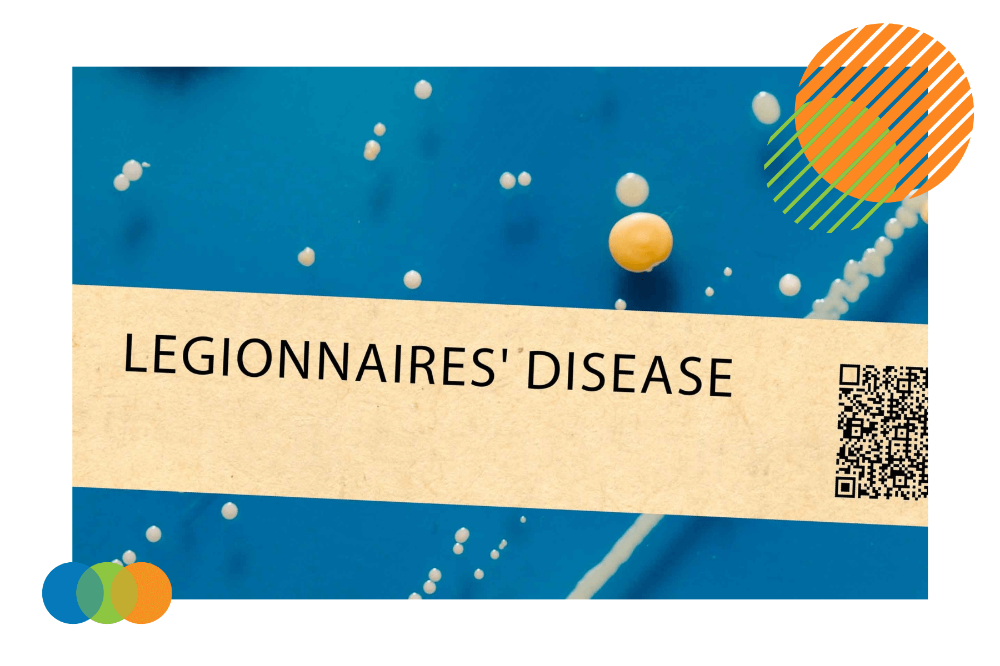 |
Written by Liz McDermott |

Legionella awareness training is crucial for protecting the health and safety of workers exposed to water systems where Legionella bacteria thrive, workers who maintain building water and HVAC systems, and those exposed to water mists or sprays at work.
In this article, we discuss the importance of legionella awareness training, the learning topics addressed in such training, understand the benefits of safety training to meet compliance with regulations and guidelines, and acknowledge resources available to employees.
Why is Legionella awareness important?
In recent years, a lack of legionella awareness training has contributed to Legionnaires' disease outbreaks, highlighting the need for risk assessments and comprehensive workplace programs that provide access to the following:
- A suitable course for workers to learn sufficient skills to manage the risks associated with this potentially deadly bacteria effectively
- A written scheme of the equipment that operates under pressure and contains water
When does Legionella bacteria become a danger?
Legionella bacteria become dangerous when conditions promote their growth and multiplication. Factors contributing to Legionella bacteria's growth include:
- warm water temperatures (between 20°C and 45°C)
- stagnant water
- the presence of biofilm
- inadequate disinfection
Buildings with large and complex water systems, such as hotels, hospitals, office complexes, and schools, face the most significant risk of infection in a water system.

What is Legionnaires' Disease?
Legionnaire's disease is a severe form of pneumonia caused by Legionella bacteria that can be contracted by inhaling water droplets containing bacteria from contaminated water systems, such as cooling towers, hot tubs, decorative fountains, and other water features.
Exposure can lead to long-term health problems and even death in severe cases. Symptoms include:
- fever
- cough
- shortness of breath
- muscle aches
- headaches
Who can develop Legionnaires' Disease?
While anyone can contract Legionnaires' disease, certain employees are more likely to get the illness. These include candidates over 50, smokers, people with weakened immune systems, and those with underlying health conditions such as diabetes, kidney issues, or chronic lung diseases.
"8 to 39 pneumonia deaths in the United States
occur each week caused by Legionella." (CDC)
Is Legionnaire's Disease easily treated?
The appropriate course of treatment involves administering antibiotics. Fortunately, most cases of this illness respond well to this treatment. However, individuals may still require hospitalization to receive the necessary care.
What topics should a Legionella awareness training course include?
A comprehensive awareness training course should address the following topics for workers in the organization:
Introduction to Legionella
This section should provide an overview of Legionella bacteria, diseases related to this bacteria, and the risks associated with contaminated water.
Water Systems at Risk
This topic should cover the systems susceptible to Legionella growth, including cooling towers, hot tubs, decorative fountains, and other water features.
Legionella Legislation and Compliance
The Legionella training course should explain the legislation, legal responsibilities, approved codes, guidelines, and the importance of mandatory standards to prevent disease outbreaks.
Risk Management and Control Strategies
The Legionella awareness training course should discuss various risk management strategies, including biocides, water treatments, and sampling techniques to control Legionella bacteria in water systems effectively.
Roles and Responsibilities
This section is critical for any course. It should outline the duties of key personnel responsible for workplace hazards and managing Legionella risks, such as duty holders, building managers, maintenance staff, and officers.
Case Studies and Outbreak Reviews
The initial and refresher training course should include real-life case studies and reviews of recent Legionnaires' disease outbreaks to illustrate the importance of effective risk management and meeting legal duties.
Online Assessment and Certification
Upon completing the Legionella awareness course, participants should undergo an online assessment to test their understanding of the material covered. Successful completion of the test should result in issuing a Legionella awareness certificate.
What are the learning outcomes of taking a Legionella Awareness course?
A certificate of completion ensures workers understand the following learning outcomes of a Legionella Awareness course:
- Potential areas for Legionella bacteria breeding in building water systems
- Favorable conditions that stimulate the growth of Legionella bacteria
- How to come into contact with Legionella
- Health dangers associated with Legionella exposure
- Prevent and control strategies for complete mitigation of Legionella within a building's water structure

What are the benefits of online Legionella Awareness Training?
Online legionella awareness training offers several advantages over traditional classroom-based training, including:
- Flexibility: Online training allows participants to complete the Legionella awareness course at their own pace and schedule, making it ideal for those with busy schedules or who cannot attend in-person training sessions.
- Accessibility: Online training courses can be accessed from any location with an internet connection, making them accessible to a broader audience.
- Cost-effective: Online courses are typically more affordable than in-person training, as there are no travel, accommodation, or venue costs involved.
- Consistent Content: Online training ensures that all participants receive the same information, reducing the danger of inconsistencies in knowledge and understanding.
- Interactive Learning: An online course can include interactive elements such as quizzes, videos, and animations, making the learning experience more engaging and enjoyable.
Important Legionella Awareness Resources
Besides courses, several guidance resources are available to help individuals and organizations improve their understanding of legionella awareness and ensure compliance with legislation and guidelines. These resources include:
- HSE's Legionella and Legionnaires' Disease Guide: A free online guide provided by the Health and Safety Executive (HSE) that covers the legal requirements related to Legionella management and offers practical advice on risk management and control measures.
- CDC's Legionella Information: The Centers for Disease Control and Prevention (CDC) provides information on Legionella bacteria, Legionnaires' disease, prevention strategies, and water management programs.
- ASHRAE Standard 188: The American Society of Heating, Refrigerating, and Air-Conditioning Engineers (ASHRAE) has developed a standard for minimizing the risk of Legionnaires' disease in building water systems, which can be a valuable resource for those responsible for managing Legionella risks.
- Industry-specific guidelines: Many industries, such as healthcare, hospitality, and property management, have specific guidelines and recommendations for managing Legionella hazards in their facilities.
Conclusion: Training Staff is The Best Practice
By providing legionella awareness training and access to relevant resources, your organization can ensure water safety by effectively managing the dangers of this bacteria and maintaining compliance with applicable legislation and guidelines.
Training staff protects the health of those exposed to contaminated water systems. It helps prevent costly and potentially deadly outbreaks of Legionnaires' disease.
For more information, please contact us to inquire about our Health & Safety training programs.

